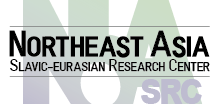'Border History' in Sapporo conference held on 3rd-4th August
On 3rd-4th August the Slavic-Eurasian Research Center hosted the conference 'Border History' as part of the project on 'Interdisciplinary Research on the Function of National Histories and Collective Memories for the Democracy in the Globalized Society'. Organized by the JSPS Topic-Setting Program to Advance Cutting-Edge Humanities and Social Science Research, the event was co-organized by the Japanese-Korean Forum of Western History and UBRJ.
During the two-days, 10 papers were given by scholars from China, Germany, Japan, Poland, South Korea and the US. The topics covered a range of time-periods from ancient, early-modern and contemporary history. The geographical scope also spanned from East Asia to the Middle East and Europe. With such a variety of approaches, a strong keynote speech to tie the conference together was essential; the audience was lucky enough to hear two such presentations. The first was given by Stefan Berger (Institute for Social Movements, Ruhr-Universistät, Bochum, Germany). Professor Berger contributed an incisive overview of Border Studies including some of the recent trends in the field as it overlaps with research on collective memory and gender. Using several examples from his own research visiting museums in China and in Belgium, the presentation emphasised how borders are 'fluid' meaning that they change as actors define them in relation to an Other. The second keynote speech came from the SRC's Akihiro Iwashita. His presentation provocatively engaged with Professor Berger's earlier effort by suggesting that Border Studies in East Asia sometimes leans towards a more positivist approach. While research on historical memory is important, it should not completely replace work on the political entanglements in the region. Nor should the more practical side of Border Studies, such as work on Border Tourism, be overlooked as a way of bringing reconciliation to a region were 'hard' borders can be difficult to cross.
As for the eight specialist papers, all were of a high quality. For this participant, two stood out as being particularly informative. One was by Malgorzata Glowacka-Grajpa (University of Warsaw, Poland) who presented on the meanings of 'Kresy' (Former Polish Eastern Borderlands) in Poland since 1945. She argued that different kinds of collective memory can be identified among those who left their homes when Poland's eastern border shifted west after the end of the Second World War. The second was by Takahiro Yamamoto (University of Tokyo) who spoke about the role of the border during the late-19th century as it affected the Kuril Islands between Japan and Russia. Professor Yamamoto's intervention into this hotly disputed border region was to emphasise that solely using a Russo-Japanese framework ignores how the islands were part of a 'North Pacific' region. The paper examined the interactions between Japan's Meiji government and Russian, British and American fur hunters. Rather than being concerned with the depletion of natural resources, the Meiji authorities were more interested in using the border to restrict the movement of people.
The quality of the conference papers and the perceptiveness of the discussants' comments made for a productive two days. The project is still in its early stages and future conferences are being planned with the next due to be held in Seoul in 2018. UBRJ looks forward to seeing how the ideas discussed in Sapporo have developed by the time that this exciting group of researchers meets again.

 Eurasia Unit for Border Research (Japan)
Eurasia Unit for Border Research (Japan)




